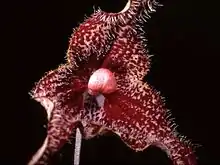Dracula
See also: Drácula
Translingual
Etymology
Medieval Latin or later, draco (“serpent, dragon”) -ula (“diminutive”)
Hypernyms
- (genus): Eukaryota – superkingdom; Plantae – kingdom; Viridiplantae – subkingdom; Streptophyta – infrakingdom; Embryophyta – superphylum; Tracheophyta – phylum; Spermatophytina – subphylum; angiosperms, monocots – clades; Asparagales – order; Orchidaceae – family
Hyponyms
- (genus): Dracula chimaera - type species; Dracula subg. Dracula, Dracula subg. Sodiroa, Dracula subg. Xenosia (subgenera)
- For a list of the numerous species, see
 Dracula on WikipediaWikipedia or
Dracula on WikipediaWikipedia or  Dracula on Wikispecies.Wikispecies
Dracula on Wikispecies.Wikispecies
- For a list of the numerous species, see
References
 Dracula (genus) on Wikipedia.Wikipedia
Dracula (genus) on Wikipedia.Wikipedia  Dracula on Wikispecies.Wikispecies
Dracula on Wikispecies.Wikispecies  Dracula on Wikimedia Commons.Wikimedia Commons
Dracula on Wikimedia Commons.Wikimedia Commons - Dracula at Encyclopedia of Life
- Dracula at National Center for Biotechnology Information
English
Etymology
From the name Vlad III Dracula (also known as Vlad Țepeș (“Vlad the Impaler”)), from the name of his father Vlad II Dracul, who was given the name Dracul by the Order of the Dragon. Dracul (literally “the Devil”) comes from the Romanian drac (“devil”), itself deriving from the Latin dracō (“dragon”).
Pronunciation
- IPA(key): /ˈdɹækjʊlə/, /ˈdɹækjələ/
Proper noun
Dracula
- (fiction) The fictional vampire in the novel of the same name by Bram Stoker.
- Synonym: Count Dracula
- A former prince of Wallachia.
Translations
fictional vampire
|
former prince of Wallachia
|
Noun
Dracula (plural Draculas)
- (nonstandard) Any vampire.
- 2004 November 16, Brian Mitsoda, Chad Moore, TJ Perillo, Jason D. Anderson, Leonard Boyarsky, Vampire: The Masquerade – Bloodlines, →OCLC, spoken by Dr. Ingvar Johansen (J. Grant Albrecht):
- But he would have had to have been over 250 years old! Like a Dracula or something.
See also
Anagrams
This article is issued from Wiktionary. The text is licensed under Creative Commons - Attribution - Sharealike. Additional terms may apply for the media files.
